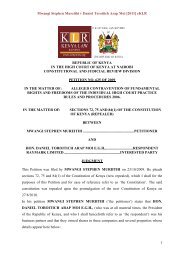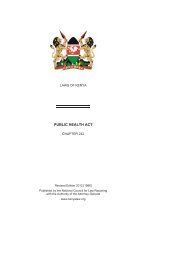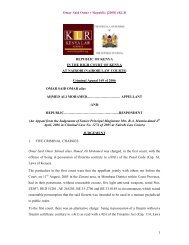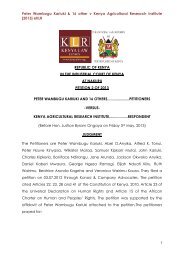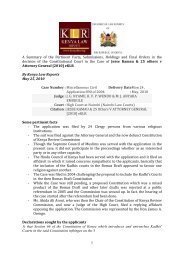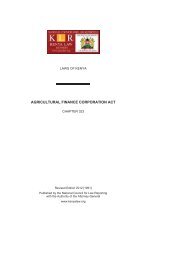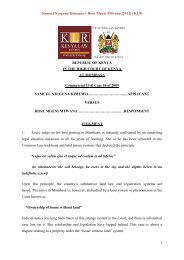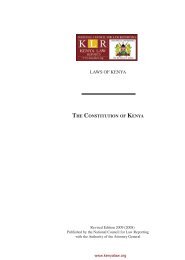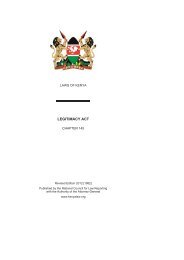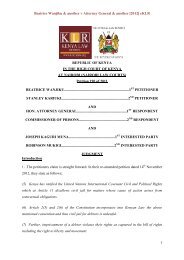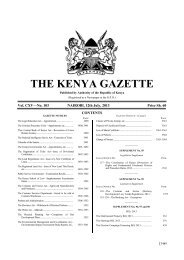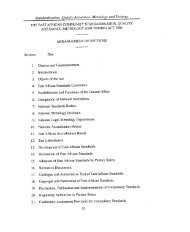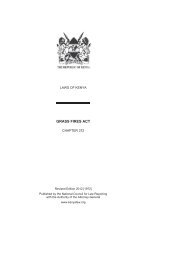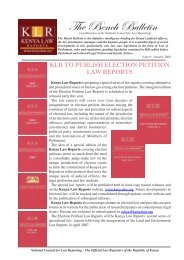download report - Kenya Law Reports
download report - Kenya Law Reports
download report - Kenya Law Reports
You also want an ePaper? Increase the reach of your titles
YUMPU automatically turns print PDFs into web optimized ePapers that Google loves.
REPUBLIC OF KENYA<br />
THE JUDICIARY<br />
INTERIM REPORT OF<br />
THE JUDICIARY WORKING COMMITTEE<br />
ON ELECTION PREPARATIONS<br />
(QUARTERLY REPORT)
LAYING THE GROUND<br />
FOR ELECTORAL JUSTICE<br />
INTERIM REPORT OF<br />
THE JUDICIARY WORKING COMMITTEE<br />
ON ELECTION PREPARATIONS<br />
(QUARTERLY REPORT)<br />
[THIS IS A WORKING REPORT]<br />
September 2012
<strong>Kenya</strong> <strong>Law</strong> <strong>Reports</strong><br />
Laying the Ground for<br />
Bench<br />
Electoral<br />
Bulletin<br />
Justice<br />
ACKNOWLEDGEMENTS<br />
This <strong>report</strong> is the product of the collaborative efforts of various actors. It would not be possible to thank<br />
everyone who has contributed to its development.<br />
The Judiciary Working Committee on Electoral Preparations is grateful for the invaluable support of the<br />
Chief Justice and the Chief Registrar of the Judiciary in achieving its mandate as set out in the terms of<br />
reference.<br />
The various stakeholders who have lent their support towards the achievement of committee’s terms of<br />
reference deserve special recognition. The work of this committee has been made easier by the generous<br />
support of the International Commission of Jurists-<strong>Kenya</strong> (ICJ-K), the International Foundation of<br />
Electoral Systems (IFES), the Electoral Institute for Sustainable Democracy in Africa (EISA), the International<br />
Development <strong>Law</strong> Organization (IDLO), and the Institute for Education in Democracy (IED), among<br />
others.<br />
The continuing research support of Petronella Mukaindo, Lucianna Thuo, Masha Baraza and Mokaya<br />
Orina is invaluable to the work of the committee.<br />
We would like to greatly thank the Judiciary’s Director of Public Affairs and Communication, Mr Naim<br />
Bilal, for his editorial leadership and input, as well as Mr John Muriuki for design and layout.”<br />
Special thanks to the International Foundation for Electoral Systems for its financial support in the<br />
publication of this <strong>report</strong>.<br />
3
Laying<br />
<strong>Kenya</strong><br />
the<br />
<strong>Law</strong><br />
Ground<br />
<strong>Reports</strong><br />
for Electoral Justice<br />
Bench Bulletin<br />
CONTENTS<br />
ACKNOWLEDGMENTS........................................................................................................<br />
FOREWORD........................................................................................................................<br />
3<br />
5<br />
PREFACE............................................................................................................................. 7<br />
LIST OF ABBREVIATIONS..................................................................................................... 8<br />
1. INTRODUCTION.................................................................................................................. 9<br />
2. ACTIVITIES TIMELINE.......................................................................................................... 10<br />
Committee outreach events and activities............................................................................... 14<br />
3. LESSONS FROM THE PAST................................................................................................... 15<br />
Lessons learnt................................................................................................................ 15<br />
Recent cases touching on the electoral process............................................................ 16<br />
4.<br />
5.<br />
a. Election date case and appeal......................................................................................<br />
b. Boundaries delimitation cases......................................................................................<br />
c. Challenges on party nomination processes...................................................................<br />
ALIGNING THE LEGAL FRAMEWORK FOR ELECTIONS..........................................................<br />
Proposed amendments to the Elections Act.................................................................<br />
Development of election petition rules........................................................................<br />
Draft Supreme Court rules on presidential elections....................................................<br />
GOING FORWARD..............................................................................................................<br />
Training and curriculum development..........................................................................<br />
Development of rules....................................................................................................<br />
Administration of election petitions..............................................................................<br />
<strong>Law</strong> reform agenda........................................................................................................<br />
Availability of electoral laws..........................................................................................<br />
Planned activities..........................................................................................................<br />
Ongoing activities..........................................................................................................<br />
16<br />
16<br />
17<br />
18<br />
18<br />
18<br />
18<br />
19<br />
19<br />
20<br />
20<br />
20<br />
20<br />
21<br />
21<br />
APPENDIX: Work Plan on Establishing Effective Electoral Dispute Resolution Framework ......<br />
1. INTRODUCTION AND BACKGROUND.................................................................................. 24<br />
2. KEY RESULT AREAS ............................................................................................................ 24<br />
2.1 Output #1: Clear legislative framework, rules and procedures on dispute resolution<br />
developed .................................................................................................................... 24<br />
2.2 Output #2: Increased Capacity of the Judicial Officers and staff to settle electoral<br />
disputes........................................................................................................................ 25<br />
2.2.1 Objectives of the training.......................................................................................... 25<br />
2.2.2 Scope of the Training................................................................................................. 25<br />
2.3 Output #3: Administrative framework and Case Management System developed to<br />
ensure that all petitions are determined within stipulated timeframes...................... 26<br />
2.4 Output # 4 Enhanced public awareness and confidence in the capacity of the<br />
Judiciary toresolve electoral disputes.......................................................................... 26<br />
2.5 Output # 5: Capacity of the Judicial Working Committee enhanced to facilitate<br />
implementation of the TORs ....................................................................................... 27<br />
2.6 Develop and disseminate bi-monthly <strong>report</strong>s.............................................................. 27<br />
3. ALIGNMENT OF THE WORK PLAN AND KEY ASSUMPTIONS .............................................. 27<br />
4. IMPLENTATION PLAN ....................................................................................................... 28<br />
23<br />
4
<strong>Kenya</strong> <strong>Law</strong> <strong>Reports</strong><br />
Laying the Ground for<br />
Bench<br />
Electoral<br />
Bulletin<br />
Justice<br />
FOREWORD<br />
The Constitution has granted the Judiciary a critical role in the country’s electoral affairs. The Judiciary<br />
is required to effectively and efficiently resolve electoral disputes at all levels. Lack of public confidence<br />
in the Judiciary’s ability to adjudicate the dispute over the 2007 presidential election sent the country<br />
down a slippery path into a full scale crisis. It was apparent that <strong>Kenya</strong> had for a long time managed to<br />
disguise its weak electoral system from its neighbours and the world at large. The scale of the violence<br />
shocked not only <strong>Kenya</strong>ns but the whole world.<br />
The Judiciary therefore enjoyed little public trust that it could uphold its constitutional mandate of defending<br />
the principle of separation of powers. The institution had for a long time laboured under the<br />
overweening influence of the Executive, causing it to be viewed as a minion of the Executive. The Judiciary<br />
therefore enjoyed little public trust that it could uphold its constitutional mandate of defending the<br />
principle of separation of powers. Low public confidence in the Judiciary prevented it from playing its<br />
proper constitutional role. The Judiciary, as one of the arms of government, ought to play a key role in<br />
advancing the rule of law in a modern democracy such as ours. The rule of law in turn underpins socioeconomic<br />
development.<br />
Proceeding from the lessons of the past, the Judiciary has embarked on winning public faith in how it<br />
works.<br />
The promulgation of the Constitution of <strong>Kenya</strong>, 2010, gave the Judiciary a fresh opportunity to superintend<br />
over the fragile social, political and economic transition of the entire <strong>Kenya</strong>n society.<br />
In obeying the dictates of the Constitution, this third arm of government has begun implementing the<br />
Judiciary Transformation Framework (2012-2016), launched on May 31, 2012 to turn it into an efficient<br />
and effective institution that is people-centred and service-oriented.<br />
Pillar 1 of the JTF, titled ‘People-Focused Delivery of Justice’, recognises that all judicial authority is derived<br />
from the people of <strong>Kenya</strong> and must, therefore be exercised for their benefit. One of the key result<br />
areas under this pillar is Access to and Expeditious Delivery of Justice. The Judiciary has undertaken to<br />
ensure that dispute resolution systems are in line with the requirements of the Constitution in terms<br />
of timeliness in processing claims and enforcement of judicial decisions. The work of this Committee in<br />
preparing for the elections, therefore, builds on this pillar.<br />
It is against the backdrop of these changes and the unprecedented scale of the forthcoming General<br />
Election that the Judiciary Working Committee on Election Preparations was appointed. Its terms of<br />
reference are geared towards raising the Judiciary’s level of preparedness for the 2013 elections.<br />
The committee has already begun to advise the Judiciary on the administrative arrangements necessary<br />
for effective and efficient dispute resolution for the 2013 elections. The Judiciary has already set the<br />
pace for electoral dispute resolution with the successful determination of the delimitation case within<br />
the parameters established by the Constitution and the Independent Electoral and Boundaries Commission<br />
Act. Delimitation being the first stage in the electoral process, it is anticipated that this success<br />
will be replicated in other elections-related cases. We are taking stock of the lessons learnt from this<br />
process, and from the determination of other cases touching on the electoral process.<br />
Moreover, in order to build the Judiciary’s capacity to handle the multitude of cases anticipated, the<br />
Committee is preparing to conduct an extensive training of judges, magistrates and other judicial staff.<br />
This training seeks to expose judicial officers to electoral law and practice in anticipation of their role in<br />
the electoral dispute resolution process.<br />
5
Laying<br />
<strong>Kenya</strong><br />
the<br />
<strong>Law</strong><br />
Ground<br />
<strong>Reports</strong><br />
for Electoral Justice<br />
Bench Bulletin<br />
In order to be successful, any election preparation process under an electoral regime, such as <strong>Kenya</strong>’s,<br />
needs to be highly consultative. It is for this reason that the committee has, since its inception, continued<br />
to engage with other stakeholders in the electoral process in order to streamline the preparation<br />
activities of all those involved. This synergy allows not only the sharing of ideas and experiences, but also<br />
gives us an opportunity to receive feedback on how effective our own preparation activities are. This also<br />
answers to the constitutional requirement for transparency and public participation, particularly in the<br />
delivery of access to justice in electoral disputes.<br />
The committee is additionally looking into ways of engaging the public to enlighten citizens on the various<br />
avenues that exist for dispute resolution in the electoral process, aside from the courts. Admittedly,<br />
the courts have been the main actor in the electoral dispute resolution process. Despite the fact that this<br />
role is now shared with other institutions such as the IEBC and the Political Parties Disputes Tribunal, the<br />
public is not fully aware of the categories of disputes that are best referred to which body.<br />
Every <strong>Kenya</strong>n is keen to ensure that we do not have a repeat of the events succeeding the 2007 elections.<br />
To say that the work of this committee is important is a gross understatement. The work of this committee<br />
lays the foundation for not only the Judiciary’s preparations for the electoral process but also gives<br />
the Judiciary a new lease of life in its handling of electoral disputes -- one that ensures that the fairness<br />
and effectiveness of the electoral system is incontrovertible.<br />
Hon. Dr. Justice Smokin Wanjala<br />
Acting Chair of the Judiciary Working Committee on Election Preparations<br />
Judge of the Supreme Court of <strong>Kenya</strong><br />
6
<strong>Kenya</strong> <strong>Law</strong> <strong>Reports</strong><br />
Laying the Ground for<br />
Bench<br />
Electoral<br />
Bulletin<br />
Justice<br />
PREFACE<br />
Since its inception, the Judiciary Working Committee on Election Preparations has been hard at work<br />
readying the Judiciary to handle the multiplicity of petitions expected from the forthcoming General<br />
Election.<br />
The committee has held and attended several stakeholder forums on the electoral process. The<br />
commit¬tee recognizes that even though the role of the Judiciary appears to be at the tail end of the<br />
electoral process, it cannot be played effectively if activities within the entire process are not properly<br />
facilitated. The committee works with stakeholders to ensure that inconsistencies or deficiencies in<br />
electoral law are dealt with early and that all actors know precisely what laws will govern the electoral<br />
process.<br />
The committee has joined hands with the Judiciary Training Institute as required in its terms of reference<br />
as well as other stakeholders to develop and carry out a training programme for judges, magistrates and<br />
other judicial staff across the country between September and December 2012.<br />
After taking stock of how election-related disputes have been handled in the past and particularly of<br />
the success of the High Court in dealing with the delimitation case earlier this year, the committee is<br />
recommending to the Chief Justice administrative arrangements that can be made to efficiently handle<br />
electoral disputes. The committee has recommended pre-trial conferencing once pleadings have closed<br />
to give the judicial officers and litigants or their advocates an opportunity to set the rules of engagement<br />
in order to avoid delays experienced in the past.<br />
The committee continues to work on ways to engage the public in order to raise awareness on the<br />
fo¬rums for dispute resolution that now exist in the electoral regime in and outside the courts. This will<br />
ease the great burden placed on the Judiciary by cases improperly filed in the courts instead of in the<br />
properly mandated dispute resolution bodies.<br />
The committee is sparing no effort in ensuring that the Judiciary is ready for any eventuality after the<br />
elections. We remain confident that the Judiciary’s role in these elections will be precedent-setting not<br />
just in <strong>Kenya</strong> but around the world.<br />
Hon. Lillian Arika, Principal Magistrate,<br />
Member and CEO, the Judiciary Working Committee on Election Preparations<br />
7
Laying<br />
<strong>Kenya</strong><br />
the<br />
<strong>Law</strong><br />
Ground<br />
<strong>Reports</strong><br />
for Electoral Justice<br />
Bench Bulletin<br />
LIST OF ABBREVIATIONS<br />
AJC<br />
CIC<br />
CSO<br />
EISA<br />
EDR<br />
ICJ<br />
IDLO<br />
IED<br />
IEBC<br />
IFES<br />
JTI<br />
LSK<br />
NCIC<br />
NCLR<br />
PPDT<br />
SWOT<br />
TOT<br />
Annual Jurists' Conference<br />
Constitution Implementation Commission<br />
Civil Society Organisation<br />
Electoral Institute for Sustainable Democracy in Africa<br />
Electoral Dispute Resolution<br />
International Commission of Jurists<br />
International Development <strong>Law</strong> Organization<br />
Institute for Education in Democracy<br />
Independent Electoral and Boundaries Commission<br />
International Foundation of Electoral Systems<br />
Judiciary Transformation Institute<br />
<strong>Law</strong> Society of <strong>Kenya</strong><br />
National Cohesion and Integration Commission<br />
National Council for <strong>Law</strong> Reporting<br />
Political Parties Disputes Tribunal<br />
Strengths, Weaknesses, Opportunities and Threats<br />
Training of Trainers<br />
8
<strong>Kenya</strong> <strong>Law</strong> <strong>Reports</strong><br />
Laying the Ground for<br />
Bench<br />
Electoral<br />
Bulletin<br />
Justice<br />
1. INTRODUCTION<br />
On May 10, 2012, the Chief Justice appointed the Judiciary Working Committee on Election Preparations<br />
to design and execute a programme to build the capacity of judges, magistrates and other judicial staff<br />
on electoral matters and suggest ways of working with other stakeholders.<br />
Members of the Committee<br />
The Committee members are Justice Mohammed Ibrahim and Justice (Dr.) Smokin Wanjala of the Supreme<br />
Court, Justice David Maraga of the Court of Appeal, Justice Paul Kihara Kariuki of the Judiciary<br />
Training Institute and the Court of Appeal, Lady Justice Helen Omondi and Justice David Majanja of the<br />
High Court, Hon. Roseyln Oganyo, Senior Principal Magistrate, and Hon. Lilian Arika, Principal Magistrate,<br />
and both based at the Milimani Commercial Courts in Nairobi. The Committee has also co-opted<br />
Justice Mbogholi Msagha, Principal Judge, High Court.<br />
Terms of Reference<br />
The Judiciary Working Committee on Election Preparations was set up with a mandate to:<br />
1. Advise the Judiciary on administrative arrangements and measures for the efficient disposal<br />
of election-related disputes.<br />
2. Develop and implement, in conjunction with the Judiciary Training Institute, a training<br />
programme for the efficient and effective management of election disputes for judicial officers<br />
and support staff.<br />
3. Develop and design a system for monitoring and evaluating the management and administration<br />
of election-related disputes in court.<br />
4. Liaise and coordinate with stakeholders to ensure efficient, effective and timely resolution of<br />
election related disputes and offences.<br />
5. Advise the Judiciary on the information that needs to be developed and disseminated to the<br />
public on the avenues open to it to pursue electoral disputes and the approaches that will be<br />
employed.<br />
This <strong>report</strong> covers the committee’s work in the first 120 days and sets out a summary of the committee’s<br />
work and outlines the activities it plans to use to raise the Judiciary’s level of preparedness<br />
for electoral dispute resolution process under the new Constitution.<br />
9
Laying<br />
<strong>Kenya</strong><br />
the<br />
<strong>Law</strong><br />
Ground<br />
<strong>Reports</strong><br />
for Electoral Justice<br />
Bench Bulletin<br />
2. ACTIVITIES TIMELINE<br />
May 10, 2012: Launch of the committee<br />
The Chief Justice named the committee and publishes its terms of reference.<br />
May 29, 2012: Inaugural meeting<br />
The committee held its inaugural meeting to have reflections on the speech of the Hon. Chief Justice.<br />
The committee agreed that there was need to have a concise position paper on its engagement with<br />
stakeholders and execution of its mandate.<br />
Subsequently, the committee has held frequent meetings where members have been assigned tasks, to<br />
discuss the progress of ongoing tasks and to strategise on future tasks.<br />
June 29, 2012: Stakeholders’ forum<br />
The committee held a forum with representatives of the Directorate of Public Prosecutions, <strong>Kenya</strong> <strong>Law</strong><br />
Reform Commission, the Political Parties Disputes Tribunal, and the Independent Electoral and Boundaries<br />
Commission (IEBC) in order to have a harmonised approach to electoral disputes resolution.<br />
July 10 – July 14, 2012: Technical retreat<br />
The committee held a technical retreat in Naivasha with key stakeholders to deliberate on the legal<br />
framework for elections dispute resolutions under the Constitution of <strong>Kenya</strong>, 2010, and the mechanism<br />
for discharging the Judiciary’s mandate. The retreat drew participants from stakeholders including IEBC,<br />
PPDT, civil society and experts in the area identified the following key action points for the attention of<br />
the committee:<br />
• Design and develop a strategy for delivery of effective electoral dispute resolution<br />
• Undertake a SWOT analysis<br />
• Undertake a needs assessment – both administrative and technical<br />
• Map key stakeholders and determine the support they can offer<br />
• Develop and implement a stakeholder engagement strategy<br />
• Develop partnerships with like-minded institutions and individuals<br />
• Coordination with key agencies, organisations, etc<br />
• Note that support can be from within or external<br />
• Map internal support – based on internal capacities – existing competencies and identified<br />
capacity needs<br />
• Develop strategies that can harness existing internal competencies and also respond to<br />
internal needs – both administrative and technical<br />
• Option of establishing a sense of complementarity to respond to internal administrative<br />
and technical needs<br />
• Develop strategies to harness external support<br />
• Bear in mind issues of buy-in – confidence/trust building and legitimacy – interaction and<br />
interdependence of sectors/institutions. Question of trust building and respectful support<br />
• Necessity of an outreach and civic engagement strategy<br />
• Enhanced dialogue and consultations with external actors and agencies (at broader and<br />
selective levels) on the basis of needs and determination of preparedness<br />
• Adoption of collaboration instead of competition as a guiding principle<br />
10
<strong>Kenya</strong> <strong>Law</strong> <strong>Reports</strong><br />
Laying the Ground for<br />
Bench<br />
Electoral<br />
Bulletin<br />
Justice<br />
Cooption of the Principal Judge as a member of the Committee<br />
The committee realised that the role of the Presiding Judge of the High Court in the preparedness of the<br />
Judiciary cannot be gainsaid or overlooked. The Principal Judge is now a member of the committee and<br />
has been sitting in it since August 2012.<br />
July 20, 2012: Meeting with Uganda Judges<br />
ICJ <strong>Kenya</strong> hosted one-day meeting with Justice Remmy Kasule of the Court of Appeal in Uganda, Justice<br />
Musoke Kibuuka and Justice <strong>Law</strong>rence Gidudu , both of the High Court Uganda, with selected members<br />
of the Bar.<br />
Prior to elections, a task force is set up within the judiciary to prepare for the post election process, with a<br />
defined timeframe. It takes stock of all past petitions filed throughout the country and prepares a budget<br />
for their disposal. The provisional budget, prepared before the election year, takes into account judges’<br />
allowances, staff support and overheads. The Principal Judge, in consultation with the Chief Justice, selects<br />
a team of judges to handle the petitions.<br />
i) Training: Training/ planning processes are stock-taking opportunities whose overall objectives<br />
are to reflect and put in place measures to dispose of petitions expeditiously. The head of the<br />
Civil Division reviews general performance during the past petition session, highlights areas in<br />
need of improvement by both the Bench and Bar. This is designed to improve case management.<br />
ii) Pre-trial process: Review of the laws governing elections is discussed, including highlights<br />
of any amendments, landmark case law, approaches to affidavits, evidence, admission of<br />
documents and disclosure, burden of proof, scheduling conferences, case management and<br />
dates for beginning the petitions. The time limit for disposal of election petitions in Uganda<br />
is six months from the date of filling. Appeals are heard and determined within six months at<br />
Court of Appeal, whose decision is final. Each selected judge is given three to five petitions<br />
and is deployed to a region outside where he/she is normally stationed. Judges are required<br />
to take two months to finalise petitions.<br />
iii) Pre-trial workshops: A common consensual approach towards the subsequent trials is<br />
developed since everyone is expected to play a role and ensure the finalisation of petitions.<br />
Opportunity is given to participants to brainstorm on laws and procedures. Counsel evaluate<br />
cases ahead of trial – with discussions on points of law, not pending petitions. As a result, a<br />
significant number of petitions are settled or withdrawn. 1n 2011, out of 125 petitions filed,<br />
20 were settled and withdrawn. Only serious issues are agreed upon for trial.<br />
iv) Trial process: A petition is tried by a single judge in open court. Under the rules of procedure,<br />
judgement should be pronounced within 30 days. The sitting is on a day-to-day basis, and the<br />
judge suspends any other business for this purpose. Evidence is by affidavit, and the deponent<br />
may be cross-examined with the leave of the court. The standard of proof is on the balance<br />
of probabilities. Before trial, rules require that the court holds a scheduling conference to<br />
resolve agreed and outstanding points and possibly settle them through alternative dispute<br />
resolution. If parties reach an agreement during the scheduling, the court enters a consent<br />
judgement. If parties fail to agree but the court views that they can settle, the case is referred<br />
to a neutral person for arbitration. The court then receives agreement and enters a consent<br />
judgement. If no agreement is reached, the case goes to full trial but the parties are obliged<br />
to exhaust all options to settle. It allows parties to assess the strengths and weaknesses of the<br />
case and ‘cool tempers’ in the interim. This proactive approach by Judiciary has reduced the<br />
number of petitions.<br />
11
Laying<br />
<strong>Kenya</strong><br />
the<br />
<strong>Law</strong><br />
Ground<br />
<strong>Reports</strong><br />
for Electoral Justice<br />
Bench Bulletin<br />
v) Grounds for setting aside elections by court<br />
• Non compliance with provisions of the Parliamentary Election Act<br />
• A person other than the one elected won the election<br />
• That an illegal practice or electoral offence was committed by a candidate personally<br />
or with his knowledge and/or consent<br />
• The candidate at the time of election was not qualified for election<br />
vi) Judgment: Upon hearing a petition, a court can dismiss a petition, declare a candidate<br />
as validly elected, set aside election or order new election.<br />
August 14 – 18, 2012: ICJ <strong>Kenya</strong> Annual Jurists Conference<br />
ICJ <strong>Kenya</strong> invited the Committee members to the Annual Jurists’ Conference from August 14-18, 2012<br />
on the theme, Preparing for Elections in a Transitional Society: <strong>Kenya</strong>’s Preparedness for the Elections.<br />
Lessons drawn from the two events are:<br />
i) Run-offs<br />
• There is no clear indication how the resolution of disputes from the first round of<br />
the presidential elections. There is no express right to bring an election petition over<br />
a run-off. What happens where the runner-up position is contested, for instance?<br />
There is a potential of disputes arising from the announcement of the results of the<br />
first round. Should it be left to the High court invoke its unlimited original jurisdiction<br />
or is there a need to develop clearer rules before the elections?<br />
• There are no legal provisions on how to address such challenges -- whether the High<br />
Court could invoke its unlimited original jurisdiction to resolve disputes or if there is<br />
need to come up with clearer rules before we get there.<br />
ii) Multiplicity of electoral laws: It was noted there is a plethora of laws governing the<br />
elections and that this sometimes causes confusion and poses a danger of contradictions<br />
or inconsistencies.<br />
• The Judiciary has been left with the key and emotive task of interpreting policy issues,<br />
which is undesirable as the country risks eroding the authority of the institution.<br />
There is need for laws to be properly drafted to avoid putting the Judiciary in murky<br />
political arenas.<br />
• The roles of the various bodies involved in electoral dispute resolution are also<br />
haphazard and poses a risk of causing confusion. There is need for the public to be<br />
duly informed of the existence of other bodies and their respective roles in electoral<br />
dispute resolution.<br />
iii) Increasing the capacity of magistrates: There is a need to increase the capacity of a<br />
number of magistrates in each county to deal with county assembly electoral disputes.<br />
This will release judges to expeditiously deal with electoral petitions within the stipulated<br />
constitutional timeframe. There is need for judges to manage electoral cases while in court<br />
so as speed up the process. There is also a need to regulate and discourage adjournments<br />
and unnecessary applications.<br />
iv) New regulations: The Attorney General informed members that a number of regulations<br />
governing elections were in the pipeline, including one on campaign financing. A fear was<br />
expressed on whether this regulatory framework was excessive, especially for the bodies<br />
tasked with implementation to synthesize and implement.<br />
v) Involvement of stakeholders: Committee was encouraged to be more innovative in<br />
12
<strong>Kenya</strong> <strong>Law</strong> <strong>Reports</strong><br />
Laying the Ground for<br />
Bench<br />
Electoral<br />
Bulletin<br />
Justice<br />
discharging its mandate including setting up a stakeholders committee to work with it in<br />
effectively discharging its mandate.<br />
vi) Leadership and integrity: There is lack of sufficient enforcement mechanisms for the Chapter<br />
on Leadership and Integrity, and the Bill is yet to be enacted.<br />
vii) The two-thirds gender principle: Article 81 is likely to raise challenges on constitutionality of<br />
Parliament if its requirements are not met. There is need for clarity on this issue beforehand.<br />
viii) Diaspora vote: There an estimated 1.5 million voters in the Diaspora. There is need to think<br />
through their regulation. Currently, there is no legal mechanism in place for their registration<br />
and management.<br />
ix) Hate speech: The corrosive harm caused by hate speech, especially in a multiethnic country<br />
cannot be underestimated. New challenges are posed, especially with devolution as many<br />
counties across the country are cosmopolitan and each ethnic community is likely to be<br />
keen to have one of 'their own' win the various positions. There is a new challenge for the<br />
National Cohesion and Integration Commission, the police and the DIRECTORATE OF PUBLIC<br />
PROSECUTIONS in dealing with hate speech that employs information communication<br />
technology.<br />
x) Strict enforcement of electoral laws: There is need to punish bad behaviour and to hold political<br />
parties to account.<br />
September 4, 2012: The Committee members presented to the Secretary <strong>Kenya</strong> <strong>Law</strong> reform Commission<br />
and civil society partners the proposed amendments to the Election Act. The number of elected seats<br />
subject to potential election petitions has increased from 222 seats to 347 National Assembly seats, 67<br />
senate seats and over 1450 county assembly seats. It is anticipated that with the increase in the number<br />
of electoral positions, there will be an average of 500 petitions filed challenging the validity of the elections.<br />
It is necessary for these petitions to be determined expeditiously. The High Court, as currently constituted,<br />
with about 70 Judges, is stretched in its handling of the day to day matters. With the expected<br />
plethora of petitions, the High Court will not have the capacity to efficiently and effectively handle petitions<br />
within the set time-lines. The Committee has forwarded a proposal to the Hon. Attorney General<br />
for the law to be amended to give jurisdiction to Magistrates to handle petitions arising out of county<br />
assembly elections. Unless this is passed, the High Court may grind to a halt since the normal cases have<br />
to proceed alongside the election petitions which must be determined within 06 months.<br />
13
Laying<br />
<strong>Kenya</strong><br />
the<br />
<strong>Law</strong><br />
Ground<br />
<strong>Reports</strong><br />
for Electoral Justice<br />
Bench Bulletin<br />
Committee outreach events and activities<br />
August 7, 2012: Justice David Majanja gave a speech entitled ‘Building Confidence: Transforming the Judiciary<br />
for Fair and Peaceful Elections’ at the Ahadi Conference on Youth and Social-Economic Implications<br />
for Fair and Peaceful Elections’ at the Laico Regency.<br />
August 14 – 18, 2012: Justice David Maraga presented a paper entitled ‘The Judiciary’s Role in the Upcoming<br />
Elections’ at the ICJ Annual Jurists Conference held in Mombasa.<br />
August 24, 2012: Justice Smokin Wanjala gave an overview on the work of the Judiciary Working Committee<br />
on Election Preparations’ at the Judges’ Colloquium in Mombasa.<br />
August 28, 2012: The Chief Registrar of the Judiciary presented a paper on the role of the Judiciary in<br />
peaceful elections, analysing the activities of the Committee.<br />
14
<strong>Kenya</strong> <strong>Law</strong> <strong>Reports</strong><br />
Laying the Ground for<br />
Bench<br />
Electoral<br />
Bulletin<br />
Justice<br />
3. LESSONS FROM THE PAST<br />
Despite the coming into effect of a new constitutional dispensation and significantly amended electoral<br />
laws, there are important lessons to be drawn from the handling of parliamentary election petitions<br />
emerging from the last General Election in 2007. Contested issues centred mainly on:<br />
i. Scrutiny of votes recorded<br />
ii. Scrutiny of rejected votes<br />
iii. Scrutiny of registered voters<br />
iv. Record of the votes cast<br />
v. Re-count of ballot papers<br />
vi. Conduct of returning officer/agent<br />
vii. Examination of voter registers at polling stations<br />
viii. Electoral offences and misconduct at polling stations.<br />
The main challenges the courts faced included:<br />
1. Judges hearing petitions alongside the routine cause list<br />
2. Lack of training or experience for judicial officers in regard to electoral law, practice and<br />
procedure.<br />
3. Unchartered territory around procedural requirements, especially the requirement for personal<br />
service.<br />
4. Preliminary matters and interlocutory applications.<br />
5. Witness intimidation.<br />
6. Obtrusive nature of oral and written submissions.<br />
7. Prolonged and winding cross-examinations; calling unnecessary witnesses; witnesses repeating<br />
the same facts.<br />
8. Prioritising the advocate’s diary.<br />
9. Inflammatory and unhelpful media <strong>report</strong>ing.<br />
10. Ethnicity/political pressure.<br />
11. Judicial discretion and the need for comprehensive rules.<br />
12. The security for and preservation of electoral materials.<br />
13. Equipment.<br />
14. The role of the Deputy Registrar and staff, and the need for training in regard to election<br />
dispute management.<br />
15. The long and tedious examination of election materials.<br />
Lessons learnt<br />
1. Training for judicial officers is needed to enable the control of the court process. There is also<br />
need to expose them to the challenges they should expect during the consideration of election<br />
petitions.<br />
2. Judicial officers should give directions to litigants and their counsel the priority being that the<br />
matter must be disposed off expeditiously.<br />
15
Laying<br />
<strong>Kenya</strong><br />
the<br />
<strong>Law</strong><br />
Ground<br />
<strong>Reports</strong><br />
for Electoral Justice<br />
Bench Bulletin<br />
3. Judicial officers should expect delaying tactics and think through how to respond to them beforehand.<br />
4. The hearing of matters should be fixed on a daily, continuous basis. Adjournments should be discouraged<br />
and/or avoided. Dates should be given at the court’s convenience and not at the advocate’s.<br />
5. A pre-trial conference should be held, with the judge sitting with advocates in chambers and agreeing<br />
on the mode of operation after going through the relevant legislation, rules and regulations.<br />
6. Judicial officers should compel parties to call necessary witnesses who have been mentioned.<br />
7. Courts should intervene where delaying tactics are being employed through unnecessary crossexamination,<br />
and objections, as well as control members of public and caution media on <strong>report</strong>ing.<br />
8. Judges order tallying processes, while a recount is ordered by Deputy Registrar within a specific period.<br />
9. The Judge should direct parties to begin preparing submissions as the case progresses. They can start<br />
with the narrative-because if one waits until completion it takes too long-then on completion analyze,<br />
make decisions and give reasons. This way, judicial officers would be able to write judgments within<br />
10 days (by using a computer).<br />
10. Deputy Registrars and staff should be trained as they are the ones presented with ballot boxes.<br />
11. At the time when documents are being filed, the Deputy Registrar should have a register to record<br />
documents -- to avoid interlocutory issues arising about receipt records.<br />
12. Witness protection (both outside and inside court) should be arranged though the provision of a<br />
witness waiting room -- under guard.<br />
13. Advocates’ non-appearance should be following by the issuance of summonses, and subsequently<br />
by the case proceeding ex parte, with the judicial officer ordering that the client be served.<br />
14. There is need to make rules setting out clearly who should recount ballots and set a time within<br />
which counting must be completed.<br />
15. Judicial officers should require the filing of witness statements to avoid delaying tactics.<br />
16. Where a complaint is over the scrutiny of ballot, the judicial officer should conduct the scrutiny<br />
before hearing.<br />
17. Where complaint relates to polls in a particular polling station, why not order partial scrutiny and<br />
conclude case?<br />
Recent cases touching on the electoral process<br />
a. Election date case and appeal<br />
This case presented the courts with an opportunity to interpret the Constitution in regard to the<br />
date of the next General Election. By approaching the courts for interpretation, the committee notes<br />
that there is public confidence in the Judiciary as the electoral cycle begins. This case, which raised a<br />
great deal of public interest, provides a lesson to the Judiciary on what to expect in related matters<br />
around the electoral period. The Judiciary exercised efficiency in ensuring the decisions both in the<br />
High Court and Court of Appeal were delivered in a timely manner.<br />
b. Boundaries delimitation cases<br />
The challenges to the IEBC decision in delimiting boundaries were of an unprecedented nature, and so<br />
were the issues raised therein. From the beginning of the cases, the bench of judges, noting the strict<br />
16
<strong>Kenya</strong> <strong>Law</strong> <strong>Reports</strong><br />
Laying the Ground for<br />
Bench<br />
Electoral<br />
Bulletin<br />
Justice<br />
constitutional timelines, engaged the participants for purposes of achieving expeditiousness in the<br />
trial of issues. The lessons to be drawn from this case are the importance of pre-trial engagements<br />
to save on time and especially in the anticipated petitions arising out of the 2013 elections. The<br />
court was able to hear and determine the 136 cases filed within the three-month constitutional<br />
timeline. It is a definite reference point for upcoming election-related court actions.<br />
The Judgment shall be published by the Judiciary in conjunction with the NCLR to make it accessible<br />
to the public.<br />
c. Challenges on party nomination processes<br />
Applications nos. 357, 358 and 359 of 2012 were cases filed to challenge to the party nomination<br />
processes for by-elections in Ndhiwa, Kangema and Kajiado North. The court in these cases has<br />
made it clear that the Judiciary will not entertain claims where other bodies have jurisdiction. An<br />
important lesson from these recent decisions is that duplication of roles is avoided and the courts<br />
will be freed to handle disputes expeditiously while other bodies that have jurisdiction to handle<br />
other matters are strengthened.<br />
17
Laying<br />
<strong>Kenya</strong><br />
the<br />
<strong>Law</strong><br />
Ground<br />
<strong>Reports</strong><br />
for Electoral Justice<br />
Bench Bulletin<br />
4. ALIGNING THE LEGAL FRAMEWORK FOR ELECTIONS<br />
Proposed amendments to the Elections Act<br />
The Committee, in executing its mandate of ensuring efficient, effective and timely resolution of election related<br />
disputes, has embarked on a review of the Elections Act, 2011 with a view to proposing amendments where<br />
necessary. The committee noted that due to the voluminous nature of the anticipated petitions out of the 2013<br />
elections, the High Court was likely going to be overwhelmed hence the need to amend the Elections Act to give<br />
some jurisdiction to the Magistrates Courts in county elections.<br />
The committee drafted a proposed amendment to Section 75 of the Elections Act to provide that petitions arising<br />
from County Assembly elections be heard and determined by the Magistrates Courts.<br />
The committee further proposed amendments to the Elections Act to provide for time limits for hearing and<br />
determination of appeals and the scope of appeals, if any, from the decision of the Magistrate’s Court or the<br />
High Court. The proposed time limit for hearing and determining appeals was set at 6 months, and the scope of<br />
the appeals limited to matters of law only.<br />
Since there is no provision in the Elections Act for the making of rules to govern the filing and determination of<br />
election petitions, the committee proposed a further amendment to the section 96 of the Elections Act to give<br />
the Rules Committee of the High Court the power to make rules regarding election petitions.<br />
Development of election petition rules<br />
The committee is actively involved in the continuing development of rules on elections by the IEBC, the legislative<br />
draftsman and <strong>Kenya</strong> <strong>Law</strong> Reform Commission Representatives from the committee secretariat are attending<br />
meetings organised by the two stakeholders to brainstorm on the draft rules. A finalised draft of the rules<br />
will be circulated in due course.<br />
Draft Supreme Court rules on presidential elections<br />
The Committee has finalised draft Supreme Court Rules on Presidential Elections, which have been forwarded<br />
to the Chief Justice to generate discussions with a view to validation.<br />
The Supreme Court Technical Committee on Rules is scheduled to commence work on the rules.<br />
18
<strong>Kenya</strong> <strong>Law</strong> <strong>Reports</strong><br />
Laying the Ground for<br />
Bench<br />
Electoral<br />
Bulletin<br />
Justice<br />
5. GOING FORWARD<br />
The committee has approved a work plan for the period August 2012 till the end of the elections with<br />
activities ranging from the training of judicial officers, to administrative measures to be taken and engagement<br />
with stakeholders.<br />
The Judiciary Working Committee on a session on the Election Petition Rules for the period August 2012.<br />
A draft curriculum is ready and awaiting expert critique and revision. Meetings with partners in civil society<br />
such as IFES, IED, IDLO and ICJ- <strong>Kenya</strong> have been held to seek assistance for capacity building through<br />
facilitation of trainings, provision of expertise and input into the draft curriculum.<br />
An August 30, 2012 meeting with EISA, IFES, IDLO, IED and ICJ- <strong>Kenya</strong> yielded agreements on Judiciary<br />
capacity building as outlined here:<br />
Training and curriculum development<br />
Judicial officers will be trained on all aspects of election petition management. Judges will be the immediate<br />
target group as currently prescribed by the law. Due to their experience in the expeditious handling of<br />
election petitions within a devolved system of government, it was proposed that the Ugandan judiciary<br />
be involved in the training of Judges.<br />
Magistrates play an important role in handling electoral and related offences, , chief among which relate<br />
to mpunity, campaign violence, and hate speech. Once the law in regard to Campaign Financing law is<br />
passed, magistrates will deal with offences under it, hence the need for their training. In anticipation of<br />
the passing of the proposed amendments to the Election Act regarding the jurisdiction of the magistracy<br />
to hear county election petitions.<br />
Magistrates will be trained at a later stage in handling election petitions. The Working Committee will<br />
undertake the training with the assistance of JTI and civil society organisations and in particular utilise-<br />
Training of Trainers (ToT) ) strategy in regard to the training of magistrates. The benefit of such a strategy<br />
will also be to improve the long-term internal training capacity within the Judiciary.<br />
Training materials and the curriculum developed will be reviewed and validated with stakeholders before<br />
19
Laying<br />
<strong>Kenya</strong><br />
the<br />
<strong>Law</strong><br />
Ground<br />
<strong>Reports</strong><br />
for Electoral Justice<br />
Bench Bulletin<br />
training commences. An online module will be used to a limited extent, where possible.<br />
Each organisation represented would confirm the extent and level of technical as well as financial assistance<br />
it will be able to provide.<br />
IFES was given the responsibility to develop a concept Note on the training, which would be reviewed.<br />
Development of rules<br />
The draft rules on the Presidential Petitions and Elections Act that have been developed will be circulated as<br />
a matter of priority, as they will from part of the training focusing on both substantive and procedural law as<br />
well as the administration of election petitions.<br />
A subsequent meeting will be arranged with the committee, the LSK and civil society partners to validate the<br />
rules and to lobby for the publication of the Bills.<br />
Administration of election petitions<br />
ICJ-<strong>Kenya</strong> and EISA will graciously help the Committee in developing rules to guide courts in the management<br />
of cases before them.<br />
In addition to training judges on the management of election petitions, the curriculum will also have a component<br />
for the training of administrative and support staff so that they are can assist judges in the timely<br />
disposal of election petitions and in the management of the anticipated workload.<br />
There is need to clarify in the rules on the administration of election petitions the roles of the various bodies<br />
tasked with the adjudication of election disputes, e.g., the IEBC, Political Parties Disputes Tribunal, and the<br />
courts. This is especially with regard to possible overlaps in their mandate and transfer of jurisdiction to the<br />
magistrates’ courts should amendments to the law succeed.<br />
<strong>Law</strong> reform agenda<br />
Partners will review the laws governing elections and identify any other gaps and areas requiring amendments.<br />
The Institute for Education in Democracy will then prepare a joint memorandum of views on the<br />
gaps for the committee’s consideration.<br />
International Development <strong>Law</strong> organisation proposes to attach a pool of experts and researchers to the<br />
Secretariat to start anticipating possible scenarios and research on case law and authorities from comparative<br />
jurisdictions, well before petitions are filed. This will free judicial officers.<br />
Availability of electoral laws<br />
The National Council for <strong>Law</strong> Reporting is compiling a special CD ROM on electoral laws, in place of a grey<br />
book on electoral laws. The NCLR’s PDF statutes have no restrictions against copying of text, which will assist<br />
judicial officers in writing decisions. NCLR will make sufficient copies of the CDs for every judge, magistrate<br />
and legal researcher by mid September. The copies of these statutes have been updated, with all amendments<br />
in force to date. The statutes can be <strong>download</strong>ed for free from their website. The contents are:<br />
1. (NCLR) Constitution of <strong>Kenya</strong> 2010<br />
2. Appellate Jurisdiction Act (Cap. 9), and Court of Appeal Rules, 2010<br />
3. Civil Procedure Act (Cap. 21), and Civil Procedure Rules, 2010<br />
4. County Governments Act<br />
20
120 - Day<br />
<strong>Kenya</strong><br />
Report<br />
<strong>Law</strong><br />
on<br />
<strong>Reports</strong><br />
the Work for the Judiciary Committee on Election Preparations Laying the Ground for<br />
Bench<br />
Electoral<br />
Bulletin<br />
Justice<br />
5. Criminal Procedure Code (Cap. 75)<br />
6. Elections Act (No. 24 of 2011)<br />
7. Evidence Act (Cap. 80)<br />
8. Independent Electoral and Boundaries Commission Act (No. 9 of 2011)<br />
9. Judicature Act (Cap. 8)<br />
10. Magistrates’ Courts Act (Cap.10)<br />
11. Penal Code (Cap. 63)<br />
12. Political Parties Act (No. 11 of 2011)<br />
13. Supreme Court Act (No. 7 of 2011), and Supreme Court Rules, 2011<br />
14. Transitional to Devolved Government Act<br />
15. Urban Areas and Cities Act (No. 13 of 2011).<br />
The National Council for <strong>Law</strong> Reporting has begun preparations to publish a Bench Bulletin on pre-election disputes<br />
for distribution to judicial officers.<br />
Planned activities<br />
a. Training of all judicial officers on election disputes and election petition management.<br />
b. Training of magistrates on election offences, mainly campaign violence and hate speech. Once the<br />
Campaign Financing law is in place, it will be included as well.,<br />
c. Training of administrative and support staff so that they can assist judges in the timely disposal of<br />
election petitions and in the management of the anticipated workload.<br />
d. Borrowing from the Ugandan experience, the development of rules to guide courts in the management<br />
of cases before them.<br />
e. The development of a strategy, in conjunction with the Director of Public Affairs and Communication,<br />
on engagement of the media and the public in addition to publishing simple materials for public<br />
awareness.<br />
f. Work closely with LSK and the legal fraternity as the election petition rules are developed<br />
Ongoing activities<br />
a. IEBC technical meetings: The jurisdiction and operations of the Independent Electoral and Boundaries<br />
Commission directly impact upon the role and responsibilities of the Judiciary in the election<br />
management process. The Judiciary, through the committee, has been invited to engage with the IEBC in<br />
its election preparations in order to build on its experience, ensure optimal utilisation and effectiveness<br />
of administrative dispute resolution mechanisms, reduce litigiousness during the electoral process,<br />
and thereby improve the transparency and accountability of the election process. The committee<br />
sends representatives to attend the relevant IEBC Technical Meetings. The committee is currently<br />
developing the proposed Rules of Procedure for the IEBC in a process that involves stakeholder<br />
meetings, development of a draft, validation workshops and public dissemination. Key input areas<br />
from the committee include the challenges of overlapping jurisdictions between the Judiciary, the<br />
IEBC, the PPDT, and the Registrar of Political Parties. There is need for harmonisation of rules and<br />
procedures; and the establishment of mechanisms of appeal.<br />
21
Laying<br />
<strong>Kenya</strong><br />
the<br />
<strong>Law</strong><br />
Ground<br />
<strong>Reports</strong><br />
for Electoral Justice<br />
Bench Bulletin<br />
b. Development of Election Petition Rules: The Committee is working with the legislative draftsman to<br />
develop the rules, which has the input of judicial officers. Part of the validation process will include using<br />
the rules as training materials during the training of judicial officers before the final draft is finalized<br />
torwards the end of November 2012. The rules will be ready for validation by end of November 2012.<br />
c. Continuous civil society and stakeholder engagement: The committee is exploiting the capacity and<br />
expertise of relevant civil society actors, particularly IFES, EISA, IED, ICJ <strong>Kenya</strong> and IDLO. Consultations<br />
are on-going with the CSOs with a view to enhancing the capacity of the committee and enabling it to<br />
effectively discharge its mandate. The CSOs are partners and stakeholders in many of the seminars,<br />
workshops and meetings attended by the committee. Their input into the work of the committee in<br />
the form of opinion and resources is valuable and continuously sought and accessed. More particularly,<br />
selected CSOs have been meeting with the committee to plan and synchronise their contributions to its<br />
work. From the provision of resource persons, training materials, facilitating training, human resources,<br />
to development of work plans, there is a continuing constructive CSO stakeholder engagement with<br />
the committee.<br />
d. Political Parties Dispute Tribunal: Mirroring the engagement with the IEBC regarding the importance<br />
of administrative dispute resolution mechanisms and the role of the Judiciary in election dispute<br />
management, the committee has also engaged with the Political Parties Dispute Tribunal. At the<br />
Tribunal’s workshop on August 10 and 11, 2012, the committee was part of discussions on how to<br />
strengthen and enhance the capacity of the PPDT to be an efficient and effective tribunal capable<br />
of expeditiously adjudicating political parties’ disputes. This includes the development of rules of<br />
procedure for the Tribunal, the discussion of the jurisprudence emerging from the courts on disputes<br />
involving political parties and their members, and appeals from the PPDT to the courts on fact and law.<br />
The involvement of the committee in the deliberations with both the PPDT and the IEBC is important<br />
because the outcomes of these engagements will feed the training programmes that seek to ensure<br />
that judicial officers have in-depth knowledge and understanding of the working administrative dispute<br />
resolution forums prior to institution of related matters before the courts directly or through appeals.<br />
e. The Committee is currently engaged in talks with the Director of Finance- Judiciary to ensure that the<br />
Judiciary prepares, well in advance and prepares a supplementary budget to cover the six-month period<br />
for election petition hearings, since each Judge will move with a court clerk, researcher and secretary<br />
to a different region to handle a petition. Per diems for the entire period and related overheads need<br />
to be factored in.<br />
22
<strong>Kenya</strong> <strong>Law</strong> <strong>Reports</strong><br />
Laying the Ground for<br />
Bench<br />
Electoral<br />
Bulletin<br />
Justice<br />
Appendix:<br />
JUDICIAL WORKING COMMITTEE ON<br />
ELECTORAL PREPARATIONS<br />
Work Plan On Establishing<br />
Effective Electoral Dispute<br />
Resolution Framework<br />
September 2012 – April 2013<br />
23
Laying<br />
<strong>Kenya</strong><br />
the<br />
<strong>Law</strong><br />
Ground<br />
<strong>Reports</strong><br />
for Electoral Justice<br />
Bench Bulletin<br />
1 Introduction and Background<br />
Chief Justice unveiled the establishment of the Committee on Election Preparations in May 2012. In his speech,<br />
he outlined the key themes which mark the responsibility of the Judiciary in Constitutional Transition. These<br />
include:<br />
· The Judiciary’s foremost role will be to interpret the Constitution and the law in order to deliver the<br />
fullest benefit due to each citizen.<br />
· Secondly, the Judiciary has a role to uphold the rule of law and ensure that justice is done to all,<br />
regardless of status.<br />
· Third, the Judiciary is required to provide leadership in ensuring the system of justice works from start<br />
to finish.<br />
· Fourth, the Judiciary must arbitrate in electoral disputes. Parties to political disputes should take notice<br />
of the decisions by the Constitutional and Human Rights Division of the High Court in referring matters<br />
to relevant tribunals rather than it being a first port of call.<br />
The themes outlined above informed the Working Committee’s terms of reference which are to:<br />
1. Advise the Judiciary on administrative arrangements and measures for the efficient disposal of election<br />
related disputes.<br />
2. Develop and implement, in conjunction with the Judiciary Training Institute, a training programme for<br />
the efficient and effective management of election disputes for judicial officers and support staff.<br />
3. Develop and design a system for monitoring and evaluating the management and administration of<br />
election-related disputes in court.<br />
4. Liaise and coordinate with stakeholders to ensure efficient, effective and timely resolution of election<br />
related disputes and offences.<br />
5. Advise the Judiciary on the information that needs to be developed and disseminated to the public on<br />
the avenues open to it to pursue electoral disputes and the approaches that will be employed.<br />
2 Key Result Areas<br />
The terms of reference outlined generate key result areas which must be achieved to create a judiciary that is<br />
accessible, responsive and effectively resolves electoral disputes in a manner that inspire public confidence and<br />
integrity of the electoral process. The key result areas deriving from the terms of reference include:<br />
1. Legal, regulatory and administrative arrangements put in place for effective and efficient resolution of<br />
electoral disputes.<br />
2. Judicial officers and staff of the Judiciary trained in electoral dispute resolution.<br />
3. Public awareness and stakeholder engagement strategy developed and implemented.<br />
4. Efficient and timely resolution of electoral dispute supported by an effective Case management system<br />
and efficient administrative framework.<br />
5. The Judicial Training Institute and judiciary secretariat adequately resourced to facilitate electoral<br />
dispute resolution.<br />
2.1 Output #1: Clear legislative framework, rules and procedures on dispute<br />
resolution developed.<br />
The Committee recognizes that the starting point to effective dispute resolution framework must be anchored<br />
on clear legislative and regulatory framework. The law should be faithful to the broad principles expressed in<br />
24
<strong>Kenya</strong> <strong>Law</strong> <strong>Reports</strong><br />
Laying the Ground for<br />
Bench<br />
Electoral<br />
Bulletin<br />
Justice<br />
the Constitution; best international practice; consistent with the <strong>Kenya</strong>n context; and facilitate the objectives of<br />
procedural and substantive justice. The Committee will work with relevant stakeholders to develop proposals<br />
for legal reform to empower the Judiciary to enact Petition Rules. The Committee will also develop draft petition<br />
rules in consultation with the IEBC, the <strong>Kenya</strong> <strong>Law</strong> Reform Commission for validation by the Rules Committee<br />
and publication by the Chief Justice.<br />
The Committee will develop a simplified guide of the rules for common reading and annotated digest of the<br />
rules which will be a reference point for the Judicial Officers. The specific deliverables under this output will be:<br />
· Draft Amendment Bill to amend the Elections Act to empower the Judiciary to make Petition Rules.<br />
· Petition Rules drafted, validated and published.<br />
· Simplified digest of the Petition Rules for common consumption.<br />
· Annotated compendium of the Petition Rules for reference by Judicial Officers.<br />
2.2 Output #2: Increased Capacity of the Judicial Officers and staff to settle electoral<br />
disputes<br />
In order to prepare the judiciary for the monumental role that is expected in the forthcoming general elections,<br />
it is important that intensive training for judges and magistrates. Such training will enhance their skills and<br />
knowledge of individual and signal the public that the judiciary is taking its role seriously in preparing for the<br />
coming elections. This will further positively impact on the independence of the judiciary as a result of judicial<br />
competence on electoral issues.<br />
2.2.1 Objectives of the training:<br />
1. Participants identify best practice, enhance their interest and develop skills and knowledge in adjudication<br />
of election disputes.<br />
2. Participants Identify strategies and approaches to enhance judicial independence, diversity, accountability<br />
in adjudicating election disputes before, during and post electioneering period.<br />
2.2.2 Scope of the Training:<br />
1. To enhance the understanding and appreciation of the Constitution, 2010 and provisions relating to the<br />
representation of the people and the central role played by the Judiciary in ensuring free and fair elections.<br />
2. To provide a clear understanding of the current law governing the conduct of elections, international<br />
standards and best practices particularly regarding arbitration of election disputes.<br />
3. To gain an understanding of practices and procedures of conducting elections disputes with a view to<br />
handling election disputes effectively and efficiently.<br />
4. To facilitate understanding of independence from democratic pressures, particularly of mass media<br />
5. To appreciate the electoral cycle, the operational issues and the stakeholders expectations.<br />
6. To enable each facilitator train other judicial officers on their role in handing election disputes efficiently<br />
and effectively.<br />
7. To foster deconstruction and construction of interpretation of law and of precedent, in the spirit of the<br />
25
Laying<br />
<strong>Kenya</strong><br />
the<br />
<strong>Law</strong><br />
Ground<br />
<strong>Reports</strong><br />
for Electoral Justice<br />
Bench Bulletin<br />
doctrine of stare decisis to avert its failure which led to inconsistent decisions and erosion of confidence<br />
in the judiciary.<br />
8. To help build competence of judicial officers in addressing electoral disputes thus instilling public confidence<br />
in judicial officers.<br />
9. To impart understanding on independence, impartiality towards credibility and independent findings and<br />
conclusions.<br />
10. To foster independence from inappropriate influence by/from legislative and executive branches of<br />
government.<br />
11. To promote sensitivity to national values and pluralism in decision making<br />
12. To promote an understanding of the legal remedies that are available to the innocent parties and the<br />
challenges that are likely to be faced in realizing the remedies.<br />
Under this output, the Committee will develop the following deliverables:<br />
· Training curriculum developed<br />
· Training plan developed and implemented<br />
· Monitoring and evaluation plan developed and implemented.<br />
2.3 Output #3: Administrative framework and Case Management System developed<br />
to ensure that all petitions are determined within stipulated timeframes.<br />
The electoral legal framework stipulates strict timeframes for resolution of electoral disputes. The traditional<br />
tools and safeguards of the adversarial system may not be well suited in achieving the efficiency bias imposed in<br />
electoral dispute resolution framework. The Committee will work with stakeholders to ensure that an administrative<br />
structures and procedures are put in place to ensure procedural safeguards are protected and the general policy<br />
of efficiency and timely resolution of disputes is achieved. Under this output, the Committee will undertake the<br />
following activities:<br />
1. Develop a case management system<br />
2. Integrate case management within the training and curriculum for judicial officers and staff.<br />
3. Training of Judiciary staff in regard to case management<br />
4. Monitoring the case management system<br />
2.4 Output # 4 Enhanced public awareness and confidence in the capacity of the<br />
Judiciary to resolve electoral disputes.<br />
The Judiciary has recognized that access to justice hinges on awareness and public confidence in the processes. It<br />
is also important to recognize that public apathy in the Judiciary begot the lack of trust which was often used as an<br />
excuse to resort to lawlessness or self help “justice.” Deliberate effort to restore the public confidence is a critical<br />
aspect of Judicial Transformation. The Committee will develop a structured framework for consultation with key<br />
stakeholders; public information in relation to election preparation; and sustained engagement in order to build<br />
confidence.<br />
The committee will undertake the following under this output:<br />
· Structured plan for engagement with stakeholders developed and implemented.<br />
· Public information handbook developed and disseminated.<br />
26
<strong>Kenya</strong> <strong>Law</strong> <strong>Reports</strong><br />
Laying the Ground for<br />
Bench<br />
Electoral<br />
Bulletin<br />
Justice<br />
· Media strategy developed and implemented in consultation with the Directorate of Communication.<br />
2.5 Output # 5: Capacity of the Judicial Working Committee enhanced to facilitate<br />
implementation of the TORs.<br />
The Judicial Working Committee requires secretariat support to support its members in planning and execution<br />
of key activities. The Committee also needs technical and financial support to implement key activities within<br />
strict timeframes. The Committee will engage researchers, consultants, work with the Directorates of the<br />
Judiciary and civil society partners to complement its work. Under this output the Committee will undertake<br />
the following:<br />
· Engage researchers;<br />
· Engage thematic consultants on Electoral Dispute Resolution and training;<br />
· Develop and implement a monitoring and evaluation framework on electoral dispute resolution;<br />
· Mobilize necessary resources<br />
2.6 Develop and disseminate bi-monthly <strong>report</strong>s.<br />
3 Alignment of the Work Plan and Key Assumptions<br />
This Work Plan forms part of the wider Judicial Reforms and will be mainstreamed under the Judiciary<br />
Transformation Framework 2012-2012. The key areas of transformation including public engagement;<br />
independence of the judiciary based on constructive consultations; integration of technology; service delivery<br />
and value for money will be cross cutting themes in the work of the Working Committee.<br />
The Committee is keen in institutionalizing the gains and ensuring sustainability of its initiatives. A key aspect<br />
of institutionalizing the work of the Committee is to recognize and support the integral part that will be played<br />
by well resourced Judicial Training Institute in the long term. The Committee will work with other offices and<br />
departments in the Judiciary in implementing its activities.<br />
Key Assumptions include the following:<br />
· That required amendments to legislative framework will be enacted;<br />
· The target of training will be all judicial officers and relevant secretariat staff;<br />
· Key stakeholders with complementing mandates in electoral dispute resolution; security and rule of<br />
law will robustly undertake their functions;<br />
· Elections will be held in accordance with the pronouncement of the courts and the electoral body;<br />
· Decisions of the courts will be respected.<br />
27
Laying<br />
<strong>Kenya</strong><br />
the<br />
<strong>Law</strong><br />
Ground<br />
<strong>Reports</strong><br />
for Electoral Justice<br />
Bench Bulletin<br />
28
<strong>Kenya</strong> <strong>Law</strong> <strong>Reports</strong><br />
Laying the Ground for<br />
Bench<br />
Electoral<br />
Bulletin<br />
Justice<br />
29
Laying<br />
<strong>Kenya</strong><br />
the<br />
<strong>Law</strong><br />
Ground<br />
<strong>Reports</strong><br />
for Electoral Justice<br />
Bench Bulletin<br />
30
<strong>Kenya</strong> <strong>Law</strong> <strong>Reports</strong><br />
Laying the Ground for<br />
Bench<br />
Electoral<br />
Bulletin<br />
Justice<br />
31
REPUBLIC OF KENYA<br />
THE JUDICIARY<br />
THE CHIEF REGISTRAR, SUPREME COURT OF KENYA,<br />
P. O. BOX 30041-00100, NAIROBI, KENYA.<br />
judiciaryworkingcommittee@judiciary.go.ke<br />
Tel: +254-20-2221221 Fax: +254-20-2318172<br />
THE JUDICIARY



